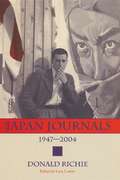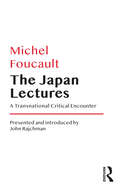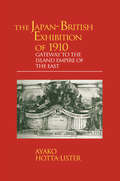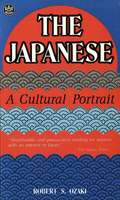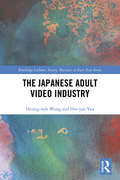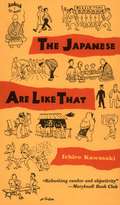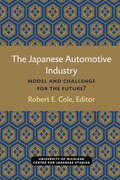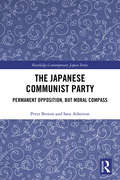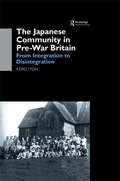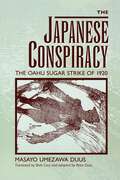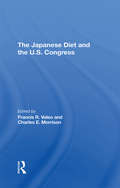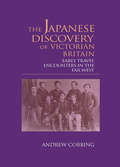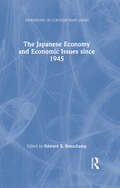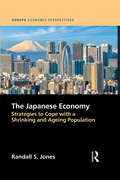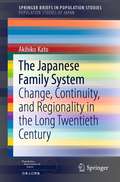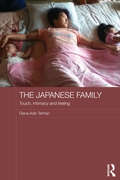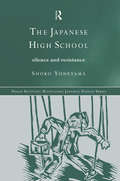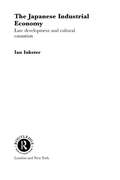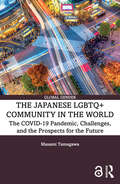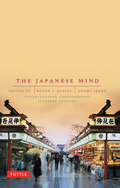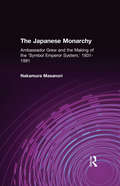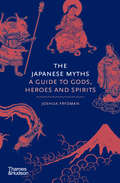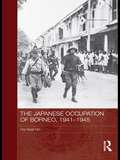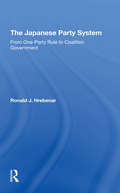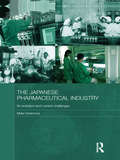- Table View
- List View
The Japan Journals: 1947--2004
by Donald Richie Leza LowitzDonald Richie has been observing and writing about Japan from the moment he arrived in Tokyo on New Year's Day, 1947. Detailing his life, his attachments, and his ideas on matters high and low, "The Japan Journals" is a record of both a nation and an evolving expatriate sensibility. Although large events loom over the chronology, the Journals are primarily about the details of ordinary life. Richie enjoyed Tokyo's varied demimonde, and he counted taxi drivers, students, cops, hustlers, transvestites, and prostitutes among his acquaintance, along with his fellow expatriates.
The Japan Lectures: A Transnational Critical Encounter
by Michel FoucaultThis book makes available, for the first time in English, lectures and interviews that Foucault gave in Japan in 1978, reconstructing their context, and isolating the question of their singular relevance for us today. In these forgotten lectures, in a free and often informal style, Foucault explores, together with his Japanese interlocutors, what it would mean to take up, from outside Europe, the questions he was raising at the time about Revolution and Enlightenment in the traditions of European critical thought. In a series of wide-ranging discussions, on sexuality and its history, non-Christian forms of spirituality, new forms of political movements, and the role of knowledge, power, and truth in them, Foucault examines these questions in relationship to Asia. He had hoped these questions, very much debated at the time in postwar Japan, would be the start of new forms of translation, publication, and exchange. At the heart of the lectures is thus a search for the creation of a new sort of transnational collaboration, recasting the history of European colonialism and opening to a philosophy no longer simply Western, yet to come. The Japan Lectures thus contribute to the new scholarship in Asian and in translation studies which has long since moved away from earlier "Area Studies"; at the same time, it participates in the new scholarship about Foucault’s own work and itinerary, following the publication of an extraordinary wealth of materials left unfinished or unpublished by his untimely death. In these ways, The Japan Lectures help us to better see the implications of Foucault’s work for philosophy in the 21st century.
The Japan-British Exhibition of 1910: Gateway to the Island Empire of the East
by A. Hotta-ListerThe rapid development of Japan at the turn of the last century, including the defeat of Russia in 1904-5, intrigued the western Imperial powers, but also aroused reactions of contempt and suspicion. Britain was the most important of the powers upon which Japan earnestly wished to impress herself to mitigate the rising tide of anti-Japanese sentiment. An exhibition in London, therefore, was seen as a timely event by the Meiji Government to advance Japanese agendas in political, economic and educational terms. This is the first major study of this remarkable venture, fully reviewed and documented, and concerned principally with the Japanese side of the story.
The Japanese A Cultural Portrait
by Robert S. OzakiIn eleven informal essays, The Japanese: A Cultural Portrait explores the character of Japan and its people. Once i n variably praised for it's "quaint Oriental charm", Japan is now strikingly western in appearance.However, in the rush to analyze. its rapid ascension to world prominence, manyWesterners forget that Japanese habits, fears, and values are rooted in centuries of feudal agrarianism. This book reminds us that although the Japanese are capable of accepting enormous change, they can also be resolutely determined to remain Japanese. Their cultural makeup has not changed as rapidly as the nation's economic landscape. To illustrate these points, various topics are examined: Japan's first encounters with the West; Japanese philosophies of government, law, and ethics; and the way that modern institutions like the bureaucracy and the corporation rely on a strong sense of group affiliation . The Japanese: A Cultural Portrait provides absorbing insight into how modernization has been accomplished without loss of national identity.
The Japanese Adult Video Industry (Routledge Culture, Society, Business in East Asia Series)
by Heung-Wah Wong Hoi-yan YauUnlike many other books on pornography which concentrate on arguments about restricting or not restricting pornography, this book focuses on the production of adult videos. It outlines and examines the industrial dynamics of the industry, its strategies, technological capabilities and organisational structure. It discusses the socialisation of those who participate in the industry, the role of censorship, the nature of markets and the wider cultural impact of the industry.
The Japanese Are Like That
by Ichiro KawasakiHere is a different book about the Japanese. A far cry from the purple prose of the starry eyed Western visitor or the sterile style of the government gazette, The Japanese Are Like That is a down·to·earth scrutiny of the so· called "inscrutable" Japanese. Armed with a cool head, the gift of clear expression, and an objectivity born of years of foreign residence, the author discusses with refreshing candor the national traits and ways of life of his countrymen, and compares them with those of other peoples, letting the chips fall where they may. Despite his background as a career diplomat, Mr.Kawasaki in this book dispenses with top hat and striped trousers and pulls no punches in exploding some popular myths and romantic illusions about Japan and the Japanese. This book is certain to provide the reader with new insights into little· known facets of Japan which very few authors have cared or dared to treat so openly. The author states his purpose in his preface: "I hope that other lands will gain a clearer understanding of 'what sort of people' the Japanese really are and that my discussion of their more lamentable characteristics will contribute to more realistic thinking about Japan.'·
The Japanese Automotive Industry: Model and Challenge for the Future? (Michigan Papers in Japanese Studies #3)
by Robert E. ColeThe Japanese Automotive Industry
The Japanese Communist Party: Permanent Opposition, but Moral Compass (Routledge Contemporary Japan Series)
by Peter Berton Sam AthertonThis book provides an historical overview of the Japanese Communist Party from its foundation to the present. It outlines the development of the party, explores its stance on key issues and discusses how the party has set a high moral tone, avoiding compromising coalitions with other parties, being intolerant of corruption within its own ranks, and frequently and consistently opposing the ruling Liberal Democratic Party. The book also considers the internal nature of the party, which continues to have a mass membership, and which in recent years has softened its former somewhat rigid approach. The book emphasizes the importance for Japan of this moral approach as the conscience of the nation, especially as the present Abe government moves Japan to the right, even though the Japanese Communist Party has never gained power and is never likely to.
The Japanese Community in Pre-War Britain: From Integration to Disintegration
by Keiko ItohExplores the origins of the community, and compares the experience of the Japanese to that of other national groups. The book discusses the community's involvement in the arts, religion and sport; intermarriage; and the second generation, and concludes by considering the impact of deteriorating relations in the 1930s and of the Second World War.
The Japanese Conspiracy: The Oahu Sugar Strike of 1920
by Masayo Umezawa DuusIn early 1920 in Hawaii, Japanese sugar cane workers, faced with spiraling living expenses, defiantly struck for a wage increase to $1.25 per day. The event shook the traditional power structure in Hawaii and, as Masayo Duus demonstrates in this book, had consequences reaching all the way up to the eve of World War II.By the end of World War I, the Hawaiian Islands had become what a Japanese guidebook called a "Japanese village in the Pacific," with Japanese immigrant workers making up nearly half the work force on the Hawaiian sugar plantations. Although the strikers eventually capitulated, the Hawaiian territorial government, working closely with the planters, cracked down on the strike leaders, bringing them to trial for an alleged conspiracy to dynamite the house of a plantation official. And to end dependence on Japanese immigrant labor, the planters lobbied hard in Washington to lift restrictions on the immigration of Chinese workers. Placing the event in the context of immigration history as well as diplomatic history, Duus argues that the clash between the immigrant Japanese workers and the Hawaiian oligarchs deepened the mutual suspicion between the Japanese and United States governments. Eventually, she demonstrates, this suspicion led to the passage of the so-called Japanese Exclusion Act of 1924, an event that cast a long shadow into the future.Drawing on both Japanese- and English-language materials, including important unpublished trial documents, this richly detailed narrative focuses on the key actors in the strike. Its dramatic conclusions will have broad implications for further research in Asian American studies, labor history, and immigration history.
The Japanese Diet And The U.s. Congress
by Francis Valeo Charles E MorrisonThe Japanese Diet and the U.S. Congress have in common many of the characteristics of democratic institutions, similarities that can be seen in the way the two legislative bodies are constituted, in what they do, and in how they do it. At the same time, there are disparities that stem from each nation's unique cultural background and political experiences. Both the similarities and the differences are treated in this unique study. The authors, well-known japanese and U.S. scholars, illuminate significant factors that not only underlie the differing roles of the Diet and the Congress in the two governments and the style of each government, but also help shape the nature of the interaction between japan and the U.S.
The Japanese Discovery of Victorian Britain: Early Travel Encounters in the Far West
by Andrew CobbingThe investigations undertaken in the pursuit of knowledge by the first overseas Japanese travellers during the 1860s and 70s have left a unique record of life in the then unknown west. Leaving behind a homeland culturally isolated for more than 200 years, these samurai travellers were especially fascinated by the extent of British political and commercial influence they observed during their travels, and therefore paid particularly close attention to the Victorian world and recorded all they saw in minute detail. Their diaries and 'travelogues' comprise the single largest body of material on Victorian society to be recorded in any non-European language. This book examines the nature of these travellers' experiences and their perceptions of Victorian Britain. A deeper understanding of this rich source material is important because, although entirely unknown to British readers, the documents reveal one of the most spectacular culture shocks ever recorded in World History. They are also important because the images of Victorian and other western societies that they portrayed to the Japanese reading public in the late nineteenth century still underpin Japanese understanding of the outside world more than a hundred years later.
The Japanese Economy and Economic Issues since 1945 (Dimensions of Contemporary Japan #5)
by Edward R. BeauchampFirst Published in 1999. The best scholarship on the development of contemporary Japan This collection presents well over 100 scholarly articles on modern Japanese society, written by leading scholars in the field. These selections have been drawn from the most distinguished scholarly journals as well as from journals that are less well known among specialists; and the articles represent the best and most important scholarship on their particular topic. An understanding of the present through the lens of the past The field of modern Japan studies has grown steadily as Westerners have recognized the importance of Japan as a lading world economic force and an emerging regional power. The post-1945 economic success of the Japanese has, however, been achieved in the context of that nation's history, social structure, educational enterprise and political environment. It is impossible to understand the postwar economic miracle without an appreciation of these elements. Japan's economic emergence has brought about and in some cases, exacerbated already existing tensions, and these tensions have, in turn, had a significant impact on Japanese economic life. The series is designed to give readers a basic understanding of modern Japan-its institutions and its people-as we stand on the threshold of a new century, often referred to as "the Pacific Century".
The Japanese Economy: Strategies to Cope with a Shrinking and Ageing Population (Europa Economic Perspectives)
by Randall JonesJapan has many unique strengths, but it also faces numerous challenges, many of which are related to population ageing. Rapid demographic change is projected to reduce Japan’s population by one-quarter by 2060 while increasing the share of elderly people from 29% of the total population to 38%, which would be the highest share among advanced countries. This book analyses the Japanese economy and the challenges it faces, and suggests policies to promote wellbeing, high living standards, fiscal sustainability, social inclusion and environmental sustainability. The book’s 24 chapters focus on key aspects of Japan’s economy, including the labour market, innovation, education, women in the workforce, corporate governance, small and medium-sized enterprises, the service sector, agriculture, fiscal and monetary policy, income distribution and policies to address climate change. The volume aims to increase understanding of Japan, the world’s third-largest economy and a key player in the global economy. It will assist policymakers and serve as a resource for academics and students of economics and public policy. As Japan is a front-runner in population ageing, the book’s analysis and policy recommendations are highly relevant to other countries that are, or soon will be, facing similar challenges.
The Japanese Family System: Change, Continuity, and Regionality in the Long Twentieth Century (SpringerBriefs in Population Studies)
by Akihiko KatoThis book offers a new perspective and empirical evidence that are relevant for understanding changes in family structures, intergenerational relationships, and female labor force participation in the “strong family” societies and that also shed light on those in the “weak family” societies. Focusing on the stem family and the gender division of labor, presenting detailed quantitative evidence, and testing the theories on family change and gender revolution, the book provides a comprehensive examination of change, continuity, and regionality in the Japanese family system over the twentieth century.By analyzing data from a nationally representative life course survey with event history techniques, it investigates factors affecting post-marital intergenerational co-residence and proximate residence along with those influencing continuous and/or discontinuous employment of married women across the life course. In this way, it reveals the mechanisms underlying the stem family formation and those behind married women’s M-shaped employment pattern. It further explores regionality in the Japanese family system, applying a demographic mapping method to data from a nationally representative community survey and official statistics. The mapping analyses demonstrate persistent geographical contrasts between two types of living arrangements (single-household versus multi-household) in the stem family accompanied by two types of maternal employment (full-time versus part-time). They also reveal a historical correlation between traditional communal parenting systems and modern childcare services, linking past to present from the late nineteenth to the early twenty-first century.
The Japanese Family: Touch, Intimacy and Feeling (Japan Anthropology Workshop Series)
by Diana Adis TahhanThis book explores how the relationship between child and parent develops in Japan, from the earliest point in a child’s life, through the transition from family to the wider world, first to playschools and then schools. It shows how touch and physical contact are important for engendering intimacy and feeling, and how intimacy and feeling continue even when physical contact lessens. It relates the position in Japan to theoretical writing, in both Japan and the West, on body, mind, intimacy and feeling, and compares the position in Japan to practices elsewhere. Overall, the book makes a significant contribution to the study of and theories on body practices, and to debates on the processes of socialisation in Japan.
The Japanese High School: Silence and Resistance (Nissan Institute/Routledge Japanese Studies)
by Shoko YoneyamaFor large numbers of school students in Japan school has become a battle field. Recent violent events in schools, together with increasing drop-out rates and bullying are undermining stereotypes about the effectiveness of the Japanese education system. This incisive and original book looks at Japanese high school from a student perspective and contextualises this educational turmoil within the broader picture of Japans troubled economic and political life.
The Japanese Industrial Economy: Late Development and Cultural Causation (Routledge Studies in the Growth Economies of Asia)
by Ian InksterThis book reveals that the manipulation of culture was of more importance than the character of the original cultural stock in explaining Japan's modern industrialization. Thus the features of private enterprise culture that are so often isolated as keys to the nation's historical competitiveness may have been only temporary reflections of this wider process of cultural engineering: a necessary input into the program of technology transfer and late development.This book provides a highly reliable guide to the industrial economy and history and covers a wide ground; it will be of great interest to those involved in Asian studies, Japanese studies, plus economists and professionals in business and enterprise culture.
The Japanese LGBTQ+ Community in the World: The COVID-19 Pandemic, Challenges, and the Prospects for the Future (Global Gender)
by Masami TamagawaThis study of the Japanese LGBTQ+ community sheds light on the intersectionality of lived experiences, including gender, sexuality, family, (mental) health, race and ethnicity, migration, and nationality, offering a picture of a community whose experience is deeply embedded in the dynamic society around. The Japanese LGBTQ+ Community in the World takes an innovative approach, viewing the community as an integral part of the world in flux, rather than an isolated monoracial and monolingual tightly-knit entity. Like the U.S. and many other countries in the world, when the pandemic struck Japan, its citizens were not all equally equipped to withstand it. Due particularly to lingering systemic injustices, including stigma, ostracism from family and society, as well as lack of legal protection of their basic human rights, the pandemic has disproportionately affected the lives of LGBTQ+ individuals and couples in Japan. They face unique challenges within various facets of their lives. Their experiences are an integral part of understanding how this pandemic is affecting a societal response to an already marginalized group of individuals. This important study looks at the issues from a range of perspectives including public health care services, the media and cross-cultural experience. This book is ideal for students and scholars of gender studies, LGBTQ studies, sociology, health, and Asian studies.
The Japanese Mind
by Osamu Ikeno Roger DaviesIn The Japanese Mind, Roger Davies offers Westerners an invaluable key to the unique aspects of Japanese culture. Readers of this book will gain a clear understanding of what really makes the Japanese, and their society, tick.<P><P>Among the topics explored: aimai (ambiguity), amae (dependence upon others' benevolence), amakudari (the nation's descent from heaven), chinmoku (silence in communication), gambari (perseverence), giri (social obligation), haragei (literally, "belly art"; implicit, unspoken communication), kenkyo (the appearance of modesty), sempai-kohai (seniority), wabi-sabi (simplicity and elegance), and zoto (gift giving), as well as discussions of child-rearing, personal space, and the roles of women in Japanese society. Includes discussion topics and questions after each chapter.All in all, this book is an easy-to-use introduction to the distinguishing characteristics of Japanese society; an invaluable resource for anyone--business people, travelers, or students--perfect for course adoption, but also for anyone interested in Japanese culture.
The Japanese Monarchy, 1931-91: Ambassador Grew and the Making of the "Symbol Emperor System" (Japan In The Modern World Ser.)
by Masanori Nakamura"The Japanese Monarchy, 1931-1991", which created a sensation when first published in Japanese, clarifies US policies toward Japan's symbol emperor system before, during and after World War II. As American ambassador to Japan from 1932 to 1945, Joseph Clark Grew had contacts with groups close to the emperor as well as leading "moderates". Returning to the US after the outbreak of the war, he made many speeches, first condemning Japanese aggression, but later changing his theme from war to peace, even to suggesting that the emperor would be a key asset in stabilising Japanese society after the war, a view which was widely criticised at the time. Later, as under secretary of state, Grew came to play an important role in the formation of postwar US policy on Japan and the emperor. His view that the emperor was a pacifist who opposed and sought to end the war with the US and that thus postwar Japan should be reconstructed with the emperor and the moderates at the centre, was later adopted in the decision of Douglas MacArthur's occupation to preserve the emperor system. That the evolution of an ambassador's convictions could have such a significant impact, even to this day, on postwar US-Japan relations vividly illustrates the importance of truly understanding the history and culture of another country, whether friend or foe.
The Japanese Myths: A Guide to Gods, Heroes and Spirits (Myths)
by Joshua FrydmanAn illustrated guide to the fantastic world of Japanese myths: retelling the stories and exploring how Japanese mythology has changed over time, as new gods, heroes, and spirits have entered the canon. While people around the world love Japan’s cultural exports—from manga and anime to Zen—not everyone is familiar with Japan’s unique mythology that shapes these interests, which is enriched by Shinto, Buddhism, and regional folklore. The Japanese Myths is a smart and succinct guide to the rich tradition of Japanese mythology, from the earliest recorded legends of Izanagi and Izanami with their divine offspring and the creation of Japan, to medieval tales of vengeful ghosts, through to the modern-day reincarnation of ancient deities as the heroes of mecha anime. Mythology remains a living, evolving part of Japanese society. The ways in which the people of Japan understand their myths are very different today even from a century ago, let alone over a millennium into the past. This volume not only retells these ancient stories but also considers their place within the patterns of Japanese religions, culture, and history, helping readers understand the deep links between past and present in Japan, and the ways these myths live and grow. Author Joshua Frydman takes the very earliest written myths in the Kojiki and the Nihon Shoki as his starting point, and from there traces Japan’s mythology through to post-war State Shinto, the rise of the manga industry in the 1960s, J-horror, and modern-day myths. Frydman ties in reinventions and retellings of myths that are present across all genres of contemporary Japanese culture, from its auteur cinema to renowned video games such as Okami. This book is for anyone interested in Japan and Japanese exports, as knowing its myths allows readers to understand and appreciate its culture in a new light.
The Japanese Occupation of Borneo, 1941-45: The Japanese Occupation Of Sarawak, 1941-1945 (Routledge Studies in the Modern History of Asia)
by Ooi Keat GinThe Japanese occupation of both British Borneo – Brunei, Sarawak and North Borneo – and Dutch Borneo in 1941 to 1945 is a much understudied subject. Of particular interest is the occupation of Dutch Borneo, governed by the Imperial Japanese Navy that had long-term plans for ‘permanent possession’. This book surveys Borneo under Western colonialism, examines pre-war Japanese interests in Borneo, and analyses the Japanese military invasion and occupation. It goes on to consider the nature of Japanese rule in Borneo, contrasting the different regimes of the Imperial Japanese Army, which ruled the north, and the Navy. A wide range of issues are discussed, including the incorporation of the economy in the Greater East Asia Co-prosperity Sphere and the effects of this on Borneo’s economy. The book also covers issues such as the relationship with the various indigenous inhabitants, with Islam and the Muslim community, and the Chinese, as well as topics of acculturation and propaganda, and major uprisings and mass executions. It examines the impact of the wartime conditions and policies on the local multiethnic peoples and their responses, providing an invaluable contribution to the greater understanding of the significance of the wartime Japanese occupation in the historical development of Borneo.
The Japanese Party System: From One-party Rule To Coalition Government
by Ronald J Hrebenar“This is a nuts and bolts textbook in the best sense of the term. … It is bound to be a great boon both to teachers and students of contemporary Japanese politics.” —from the Foreword by Haruhiro Fukui This timely volume is the first book in nearly twenty-five years to focus on the party system of Japan. In the past two decades, the Japanese political scene has undergone a dramatic transformation. What had been a two-party system proliferated during the 1960s and 1970s into a seven-party system. This book provides a comprehensive look at all of Japan’s current major and minor national-level parties. For the first time in English, detailed analyses are presented on the Democratic Socialists, the Clean Government party (KÅmeitÅ), and the New Liberal Club. Thorough coverage is provided for parties in the “1955 System”—the ruling Liberal Democratic party and the two long-term opposition parties, the Socialists and the Communists. Many of the new miniparties that have appeared in recent elections are also discussed. Japanese Political Parties gives readers a solid understanding of party histories, leadership, and internal organization, as well as a look at prospects for the future. The party discussions are preceded by three chapters on the laws and political forces affecting Japanese politics. Chapter 1 describes the basic characteristics of the Japanese party system since 1945 and provides an overview of Japanese voting behavior and political values. Chapter 2 describes the “rules of the game”—the electoral laws—and discusses the ongoing political problem of malapportionment. Chapter 3 interprets data on political finance in contemporary Japan. Along with a wealth of information and interpretation, the authors offer insight into the common patterns Japan shares with democracies around the world, placing the Japanese system within the larger context of world party systems. Designed for courses on Japanese politics, this text should also prove useful to students of comparative politics and political parties.
The Japanese Pharmaceutical Industry: Its Evolution and Current Challenges (Routledge Studies in the Growth Economies of Asia)
by Maki UmemuraThis book explores why Japan, despite being a world leader in many high technology industries such as automobiles and consumer electronics, is only a minor player in the global pharmaceutical industry. Japan provides a huge market for pharmaceuticals as the second largest consumer of prescription drugs after the United States, and is a massive importer of prescription drugs, relying on discoveries made elsewhere. This book charts the development of the industry, from the devastation resulting from the Second World War to its performance in the present day. Focusing in particular on antibiotics and anticancer drugs, the book analyses factors that have prevented Japan from leading the rapid advances in science and technology that have occurred globally over recent decades. Looking at the pharmaceutical industry, the book argues that the Japanese government’s research and development policies were not sufficiently incentivising. It also shows how the nature of capitalism in Japan - which featured close relations between government and industry as well as between and within firms - was appropriate for nurturing industrial development in the immediate post-war decades, but became much less effective in later years.
